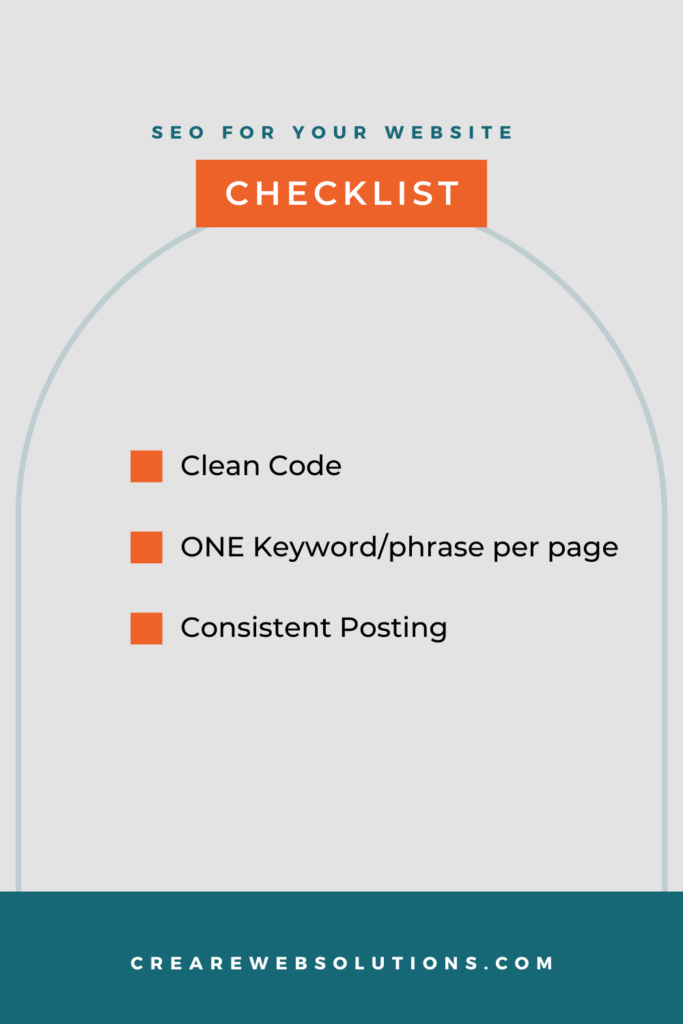Do you feel like you’ve been trying everything to reach your target audience, and just haven’t been successful? Optimizing your website for SEO is a crucial step you need to take. Even if you think you might have, chances are there is a piece missing somewhere. Incorporating SEO for your website isn’t just a one-time task—it requires ongoing attention to ensure your efforts truly connect with your audience. Below we lay out the 3 key things you need to do to ensure your website is optimized for success.
You already know search engine optimization (SEO) is crucial for ensuring your website reaches its target audience. And, while there are many strategies to improve SEO for your website, we believe starting with these 3 will set you apart. Here are our three secrets to making a huge difference in your site’s visibility:
1. Clean Code: The Foundation of SEO
Search engines crawl through the code of your website, and extra, unnecessary code can slow down loading times and make it harder for bots to understand your content. Clean, well-structured code is essential.
Many out-of-the-box page builders and templates often add layers of unnecessary code behind the scenes. While they may make design easier, this bloated code can hurt your site’s performance and SEO. For example, code-heavy templates can cause longer load times, which negatively impacts user experience and SEO rankings.
Using proper HTML mark-up can help search engines identify the important parts of your site. Tags like <h1>, <h2>, and <meta> titles act as signposts, guiding search engines through your content. A cleaner code also ensures your website is mobile-friendly, which is critical as mobile searches now outnumber desktop searches. So, skip the bulky, extra code and focus on a streamlined, clean structure.
2. Focus on One Keyword or Phrase Per Page
Each page on your site should have a clear focus. That focus starts with choosing one keyword or key phrase for each page. You then use this keyword in your meta titles, meta descriptions, alt tags, and content. Having a plugin like Yoast SEO on the back-end of your Wordpress website can help ensure you don’t optimize for the same keyword multiple times, and can give you hints on what you’re missing, and what you can tweak to see better results.
Why just one keyword or phrase? Because trying to target too many keywords waters down your efforts. Search engines rank pages based on relevance, so being laser-focused helps them understand what each page is about. For example, if your key phrase is “SEO for your website,” make sure that phrase is naturally incorporated throughout the page—without overstuffing. You could use it in headers like “How to Improve SEO for Your Website” or as part of your meta description: “Learn top tips to enhance SEO for your website.”
Also, be sure to include your phrase in alt tags for images (e.g., “SEO for your website checklist”), and ensure your content revolves around this key phrase. This makes it clear to search engines and users what your page is about, allows you to reach new segments of your audience, and helps with building authority on a variety of topics. The more relevant content you post, the more likely your site will appear in search results when people are looking for your products or services.
3. SEO for Your Website: Consistent Content is Key
Content creation isn’t a one-and-done task. Search engines love fresh content, which means a steady schedule of new posts, articles, and updates can improve your ranking. By publishing consistently, you give search engines more opportunities to crawl and index your site.
Additionally, each new piece of content is an opportunity to target different keywords or key phrases. This allows you to reach new segments of your audience while building authority on a variety of topics. But it’s not just about writing new content—it’s also about connecting it.
Linking your content to other pages on your website (internal linking) helps search engines understand the structure of your site and keeps users on your pages longer. For example, if you’re writing a blog about “website SEO,” link to previous blog posts about website development or website design. This helps spread link equity across your site and improves SEO.
Similarly, linking to relevant, authoritative external sources adds credibility to your content. Search engines recognize that you’re referencing trustworthy sites, which can boost your own authority and search rankings.
The more relevant content you post, with links to internal pages and trusted external sources, the more likely your site will appear in search results when people are looking for your products or services.

Focused SEO for Your Website
By focusing on clean code, using specific keywords per page, and publishing consistent content (with appropriate linking), your website will be well on its way to improved SEO performance. Ready to start implementing these secrets? Let’s get your website built and optimized for success!
Frequently Asked Questions
How does clean code impact SEO for a website?
Clean code makes it easier for search engines to crawl and understand your website content. It also improves site speed and mobile-friendliness, both of which are key factors in SEO for your website rankings.
Why should I focus on one keyword per page when optimizing SEO for my website?
Focusing on one keyword per page helps search engines clearly understand the topic of that page, improving relevance and ranking. Trying to target multiple keywords on one page can dilute your SEO for your website.
How can consistent content creation improve SEO for a website?
Regularly publishing fresh content gives search engines more pages to crawl and index. It also allows you to target a variety of keywords, expanding your reach and authority in SEO for your website.
What role do meta titles and descriptions play in SEO for a website?
Meta titles and descriptions use your target keywords and help search engines and users understand what each page is about. Optimizing these elements is a crucial part of SEO for your website.u003cbru003e
How can internal and external linking help with SEO for a website?
Internal linking helps search engines navigate your site structure and keeps users engaged longer. External linking to reputable sites builds credibility. Both strategies enhance SEO for your website.


